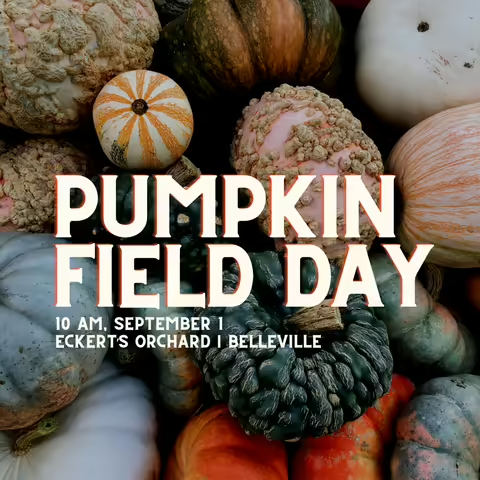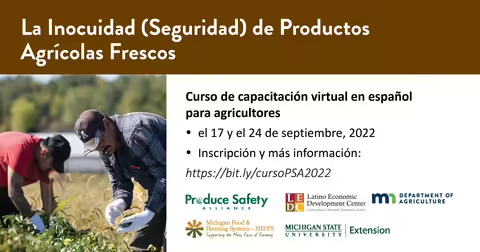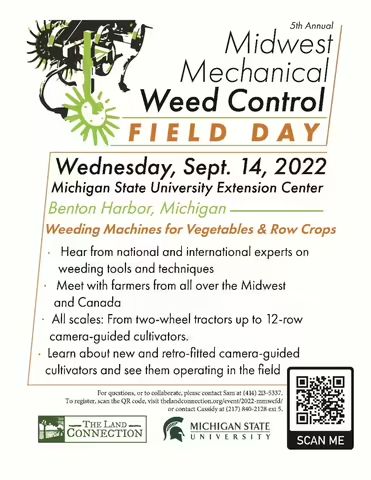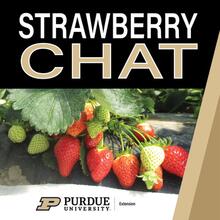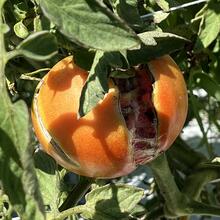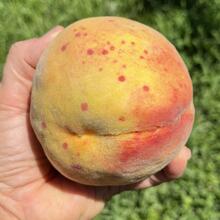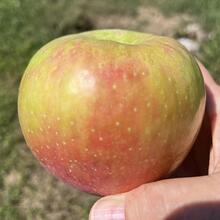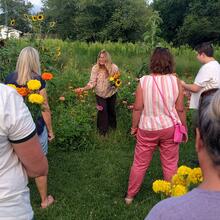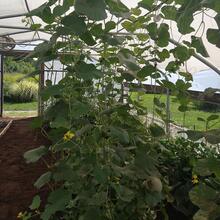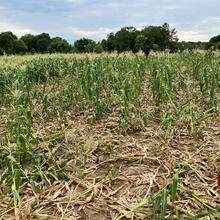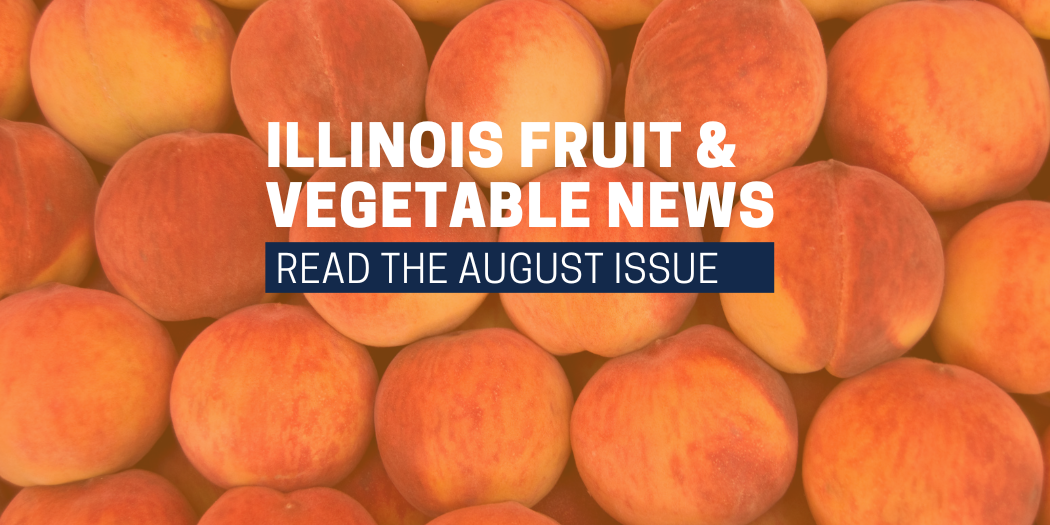
Pumpkin Field Day is September 1
Commercial pumpkin growers can enhance production practices at the upcoming University of Illinois Extension Pumpkin Field Day. The event begins at 10 a.m. Sept. 1 at Eckert’s Orchard near Belleville.
Register by Aug. 29 at go.illinois.edu/PumpkinFieldDay2022 or call the office at 618-939-3434.
The outdoor event will cover fertility management, variety selection, no-till production, and insect disease and weed management, says Nathan Johanning, Illinois Extension commercial agriculture educator.
"This year’s trials include cover crop and weed management trials and a variety trial with over 80 pumpkin varieties, including gourds, jack-o’-lantern, pie-sized, and specialty pumpkins of all shapes and colors, including many new releases just on the market," says Johanning. "It's a unique opportunity to hear from specialists on production related topics, see the trials, and network with other growers and industry vendors.
This program is free and open to anyone interested in commercial pumpkin production, Johanning says. Lunch will be provided, and outdoor program will be held rain or shine. If you will need a reasonable accommodation to participate, please email Johanning, njohann@illinois.edu. Early requests are strongly encouraged to allow sufficient time to meet your access needs.
Nathan Johanning 618-939-3434; njohann@illinois.edu
Input Needed for New Soil Forecasting Tool
Scientists at University of Illinois and University of Nebraska-Lincoln are creating a web-based application that would forecast localized soil moisture and temperature conditions for up to 10 days in advance. Before taking on this task, the group is interested in knowing how beneficial a soil moisture and temperature forecasting tool might be to Illinois farmers and ag professionals.
Each day weather and climate data from the 19 Illinois Climate Network sites is collected and made available on the Water and Atmospheric Resources Monitoring Program (WARM) website. Two apps were developed in the past for the agricultural community - Growing Degree Day Calculator and Pest Degree Day Calculator. Both apps are used extensively during the growing season by farmers, horticulturalists, and others.
Using the extensive Illinois soil temperature and soil moisture data collection that is updated daily combined with the National Water Model and NOAA weather forecasts, this group has proposed developing web tools that will deliver updated soil moisture content and soil temperature 10-day forecasts for any location in Illinois down to a resolution of 0.4 square mile or roughly 250 acre grids. Before developing this web application, the group would like input from Illinois farmers and ag professionals as to whether this soil forecasting tool would be of value to Illinois farms and related businesses in improving their ability of make timely soil management decisions.
Please complete the short 5-question survey. Thank you for your interest in this proposed project.
Doug Gucker 217-877-6042; dgucker@illinois.edu
Virtual Spanish-language PSA Produce Safety Rule Grower Training
September 17 and 24 (two Saturdays)
8:45 AM to 1:30 PM central time (9:45 AM to 2:30 PM Eastern)
Registration
This Spanish-language course is for produce growers interested in learning about the Food Safety Modernization Act (FSMA) Produce Safety Rule and Good Agricultural Practices (GAPs). Course topics include:
- Potential sources of contamination on the farm and microorganisms of concern
- Requirements of the FSMA Produce Safety Rule
- Practical methods to reduce food safety risks on the farm
- Worker hygiene; water management; application and use of biological soil amendments
The course is free for growers in the Midwest and includes a course manual and a certificate of completion.
Curso de capacitación virtual en español para agricultores
dos sábados - el 17 y el 24 de septiembre de 2022
8:45 AM to 1:30 PM hora del centro (9:45 AM– 2:30 PM hora del este)
Inscripción
Este curso es para productores de frutas y vegetales interesados en aprender sobre la Norma de inocuidad de los productos agrícolas frescos de la ley de Modernización en la Inocuidad de Alimentos (o FSMA) y las Buenas Prácticas Agrícolas (BPA). Los temas del curso incluyen -
- Fuentes de contaminación en la granja y microorganismos de preocupación
- Requisitos de la norma de inocuidad de los productos agrícolas frescos de FSMA
- Métodos prácticos para minimizar los riesgos de contaminación en la granja
- Salud e higiene de los trabajadores; manejo de agua de uso agrícola y de mejoradores de suelo
El curso es gratis para agricultores en el Medio Oeste. Incluye el manual del curso y la constancia de finalización de la capacitación.
Laurie George ( ljg233@cornell.edu )
Midwest Mechanical Weed Control Field Day
The Midwest Mechanical Weed Control Field Day is the nation’s largest field day focused on mechanical weed control. The Land Connection is partnering with Michigan State University to host the event Wednesday, Sept. 14, at Michigan State University’s Southwest Michigan Research and Extension Center in Benton Harbor, Mich.
The morning Expo period provides opportunities to see weeding tools from many companies and to meet the farmers in attendance from all over the US and Canada. University weed scientists from surrounding states and farmer-experts will share their experiences. Walk-Behind Alley will feature demonstrations of walk-behind tractors and implements. You can also visit the exhibit booths for other companies in allied trades such as farm-service and soil amendments.
At noon, the field day will break for lunch, allowing farmers to lunch or continue looking at equipment and speaking with exhibitors. In the afternoon, attendees will follow the tractors out to the demonstration field, where corn, beets, and cabbage have been planted especially for the demonstrations. Myriad cultivators and cultivating tractors will be demonstrated in the field and explained by manufacturers. These demonstrations will show how the machines should be mounted and properly adjusted and will help farmers visualize how the implements can work on their own farms to increase efficiency and productivity.
Row-crop tools in the demonstration include the Treffler Harrow, Einbock Harrow, and several types of camera-guided cultivators with finger weeders. Demonstrations will be held in 5’’ corn.
Vegetable tools include the Tilmor Tractor and its basket weeder, parallel-unit cultivator and other tools, Steketee parallel units of side-knives and finger weeders mounted on the Franken-G, Treffler harrow, a variety of KULT-Kress belly-mounted and rear-mounted steerable tools, Mechanical Transplanter with its planting machine and plastic layer, and cultivators from Japan.
Registration for this day of learning and networking on mechanical weed control is $50. Registration includes breakfast, lunch, and all the demos you can handle. It is recommended that everyone register early as each year space runs out.
- When: Wednesday, September 14, 2022, 9 am to 4:30 pm
- Where: MSU Southwest Michigan Research and Extension Center, 1791 Hillandale Rd, Benton Harbor, MI 49022
- How Much: $50 (includes lunch)
Register online. For more info on the event and registration, contact Cassidy at cassidy@thelandconnection.org or (217) 840-2128. If you wish to bring a cultivator to the field day, that would be wonderful. Please call or text Sam Oschwald Tilton at 414-213-5337 or email at glacialdrift@protonmail.com.
Check Out Purdue’s New Strawberry Chat Program
Strawberry Chat is a virtual discussion about strawberry production at small and diversified farms in Indiana and neighboring states. Dr. Wenjing Guan and Rd. Miranda Purcell from Purdue University are the program's hosts. Our discussions focus on activities that happen at the time of the year and cover different production systems.
If you are interested in joining the Strawberry Chat email list and receiving the podcast update, please email us at Wenjing or email Miranda.
St. Louis Metro East Regional Report
Be careful what you wish for. This time last newsletter, we all needed rain. Shortly after, some in the region got a nice amount, but others experienced what was described as a 1000-year rain event; upwards of 7+ inches in one fell swoop. As a result, tomatoes close to harvest water cracked, but immature green fruit at the time appear unaffected and continue to ripen. The heat stayed with us until the first week of August, and night temperatures are now significantly cooler; down to the upper 60s and low 70s. Daytime highs have dropped into the 80s. Cooler temperatures favor female flower development in pumpkins as well as overall less stressful to plants. Pumpkins are looking good, except in low areas where ponding occurred with the recent rains. Pennsylvania noted the arrival of downy mildew in pumpkins, so pumpkin growers are advised to stay vigilant in their scouting and timely fungicide applications.
Peach harvest is in the ‘Messina’ window, moving into ‘Cresthaven’ for the southern half of the St Louis Metro East. The more northerly peach production areas are running a week to a week and a half behind that. I have seen some absolutely beautiful peaches, especially as we move into the longer season cultivars. Oriental fruit moth is usually the normal suspect when a “worm” is found in peach fruit, but recently it has been plum curculio being found.
Since the larvae can look somewhat similar with the naked eye, Dr. Kacie Athey suggested the first comparison should be whether legs are present or not. Oriental fruit moth has legs and plum curculio, being a beetle, does not. If you run across a “worm,” take a closer look to identify whether it is a plum curculio or not. Kacie and I are tracking its presence, so let either of us know if you suspect plum curculio. Red spots on peach and nectarines are usually an indication of San Jose scale.
Fall apple harvest will begin in the next week to 10 days with ‘Gala.’ Despite the past heat, color development is looking good, even on Honeycrisp.
Elizabeth Wahle 618-344-4230; wahle@illinois.edu
- Top Photo: Tomato water-crack after heavy rainfall. Photo by E. Wahle.
- Middle Photo: San Jose scale on peach. Photo by E. Wahle.
- Bottom Photo: ‘Honeycrisp’ color development 3 weeks out from harvest. Photo by E. Wahle.
Southwestern Illinois at Waterloo Regional Report
The weather had been much more kind to us in the last few weeks than before. Most of our area has gotten at least 3-5” inches of rain total over the last month and some areas have had rain in excess of that. This rain wasn’t any to early as locally we were in drought conditions with crops under a huge amount of stress. Temperatures are now in the low to mid 80s which feels like a dream compared to the previous months where it field 95° or higher was the norm. I think some regular precipitation and moderate temperatures are supposed to continue for now.
Crops have rebounded greatly, and most have been refreshed by the rain. We are in the heart of peach season and now have a full array of summer vegetable and melons available. A few of the wildlife issues I have encountered in the last month are excessive issues with racoons in sweet corn and also major vole issues in pumpkins. I have had voles working over young pumpkin plants quite a bit. By now they have done what they will, but I am worried about their presence as we get fruit set as then fruit feeding can be an issue. Across the board, voles seem to be very problematic even in row crops like soybeans. I have had many reports of them causing significant stand loss in double crop soybeans.
Pumpkins are finally growing happily with the rain. At home my pumpkins had been struggling until some of the rains in the end of July, but since then there is no stopping them and we have nice sized fruit set and growing. I still do think we lost at least a week or more of time for that first fruit set due to the dry conditions. I sidedressed nitrogen and the night I finished we got a random 0.6” of rain. I will take that as some form of apology from Mother Nature for the lack of rain earlier in July. I have just started my fungicide spray program and have seen no signs of any early powdery mildew infection yet. I have seen some cucumber beetles especially on the winter squash varieties we raise but nothing so bad that I would use an insecticide. This year I have many of the C. maxima family of specialty pumpkins like the winter squashed grouped together. They are so attractive to cucumber beetles I might just mix up enough insecticide to just spray them at leave the remaining part go until insect pressure increases. Without scouting, insecticides are often over sprayed in pumpkins as its too easy to just add it while spraying a fungicide just in case. This can often lead to removing beneficial predators of aphids and other pests and adds unnecessary insecticide costs.
Pumpkin Field Day is coming up Sept. 1 at Eckert’s in Belleville. See the article earlier in this issue for all the details. I look forward to getting to meet with many of you I email and get calls from and share current research updates and management strategies. We have a many of our pumpkin experts lined up to share their knowledge. Hope to see you there!
Nathan Johanning 618-939-3434; njohann@illinois.edu
Southern Illinois at Murphysboro Regional Report
It has been a busy summer in Jackson County. We recently hosted Christina Lueking, Extension educator for Bond, Clinton, Jefferson, Marion, and Washington counties, for a program on cut flower production and arrangement. Participants learned about growing cut flowers in field and landscape settings, then toured the grounds and cut their own arrangements.
In the high tunnel, we have tomatoes, peppers, ginger, and personal sized melons. The melons were vertically trellised similarly to cucumbers, but a single leader was trellised, and other vines could grow in the bed instead of being pruned off. This system worked well, but in the future, I would prune or trellis more vines instead of leaving them on the ground. The lower vines had more insect damage and fruits were more likely to be damaged.
The ginger has taken off in the high tunnel, after struggling initially. The extreme temperatures in late June and early July stressed the plants and caused some yellowing. The four varieties of ginger and one variety of turmeric will be harvested in the fall for “baby” or new ginger. Currently we have hilled the ginger twice and fertilized at each hilling. The biggest challenge so far has been cooling the plants enough in the high tunnel.
Katie Bell 618-687-1727; klbell@illinois.edu
- Top photo: Chris Lueking discussing cut flower production during a program at the Jackson Co Extension office. Photo by K. Bell.
- Bottom photo: Specialty melons trellised and growing vertically in the high tunnel at the Jackson County Extension office. Photo by K. Bell.
Dixon Springs Ag Center Regional Report
We were missed by the heavy rain events earlier in the month in our far southeastern portion of the state, and we actually could use a bit of rain. We are very grateful for the cooler temperatures of the past several days as the prolonged heat and humidity of the past month a and a half was becoming oppressive.
Adequate moisture is important this time of year to our perennial small fruit crops, especially blueberries, as they are forming fruit buds for next year’s crop. Dry conditions may necessitate the need to irrigate to help ensure a full crop load so be prepared with supplemental water if mother nature presents us with dry conditions.
Field and bed preparation should be underway for those setting out plasticulture strawberries, keeping in mind the planting window for the plug plants ranges from September 1-15, depending on your location. Deer fencing around your strawberry field is highly encouraged as tender young, actively growing strawberry plants are irresistible. Having the fence up and “hot” before you plant MAY provide a bit of training and redirecting of patterns and possibly lower the deer pressure around your field.
The strawberries growing hydroponically in the vertical stacks at DSAC have been enjoying the cooler temperatures of the past 10 days, and an increase in flowering is noticeable. We are continuing to harvest cucumbers and they have also benefited from the cooler temperatures. Harvest of our tomato variety trial plots has really slowed down due to flower abortion caused by the heat and humidity. New flowers and small green fruit are forming again but I don’t know that we will see much yield from those before we have to remove the plants in preparation for the next research project. The bell pepper variety trial is still going strong, with another round of nice fruit harvested this past week. We have observed spotted wing drysophila (SWD) on some of the nearly ripe tomato fruit still on the plants. As SWD populations build through the season, remember that management has multiple avenues that include not just spraying but also removal of overripe and cull fruits well away from the plants and surrounding growing area.
The final treatment of predatory insects are being released this week as part of our biological insect control project, with an overall insect species survey being conducted two weeks later. The information from this second year of the research project will be compiled and analyzed by Dr. Athey and her lab, and it will be interesting to see the comparisons between year one and year two. We will be building on this research with another funded project looking at strategies to improve biological control of insect pests for vegetable grower utilizing high tunnels.
Bronwyn Aly 618-695-2441; baly@illinois.edu
Less Seriously
I want to know how many racoons it takes to eat an ENTIRE ¼ acre of sweet corn! I like corn but I can’t eat that much sweet corn. I hope they had a good belly ache! If I could get farmers (present readers excluded) to show up to programs like these racoons showed up to my corn, my job would be so much easier! Nathan
Upcoming Events
Pumpkin Field Day
September 1, beginning at 10 a.m. Eckert’s Orchard, 951 S. Green Mount Rd, Belleville, IL 62220.
The program will include in-field presentations and field research tours with over 80 pumpkin varieties, no-till production, pest management and marketing along with an opportunity to network with ag industry representatives. The field day is free of charge and lunch is provided. Registration is require by Monday, August 29 at go.illinois.edu/PumpkinFieldDay2022 or call 618-939-3434. For more details contact Nathan Johanning at njohann@illinois.edu.
Addressing Legal Farm Risks | A series of free webinars from Illinois Extension and Farm Commons designed to minimize legal risk and build resilience for Illinois farmers. Additional information can be found here.
- October 24 Business Structure Basics
- January 23 Farm Liability and Insurance Basics
University of Illinois Extension Fruit and Vegetable Specialists
Extension Educators – Local Food Systems and Small Farms
- Bronwyn Aly: Gallatin, Hamilton, Hardin, Pope, Saline, and White Counties | 618-695-2441 | baly@illinois.edu
- Katie Bell: Franklin, Jackson, Perry, Randolph, and Williamson Counties | 618-687-1727 | klbell@illinois.edu
- Sarah Farley: Lake and McHenry Counties | 847-223-8627 | sfarley@illinois.edu
- Nick Frillman: Woodford, Livingston, and McLean Counties | 309-663-8306 | frillma2@illinois.edu
- Zachary Grant: Cook County | 708-679-6889 | zgrant2@illinois.edu
- Doug Gucker: DeWitt, Macon, and Piatt Counties | 217-877-6042 | dgucker@illinois.edu
- Grace Margherio: Jackie Joyner-Kersee Center, St. Clair County | 217-244-3547 | gracem@illinois.edu
- Grant McCarty: Jo Daviess, Stephenson, and Winnebago Counties | 815-235-4125 | gmccarty@illinois.edu
- Kathryn Pereira: Cook County | 773-233-2900 | kpereira@illinois.edu
Extension Educators – Horticulture
- Chris Enroth: Henderson, Knox, McDonough, and Warren Counties | 309-837-3939 | cenroth@illinois.edu
- Richard Hentschel: DuPage, Kane, and Kendall Counties 630-584-6166 | hentschel@illinois.edu
- Andrew Holsinger: Christian, Jersey, Macoupin, and Montgomery Counties | 217-532-3941 | aholsing@illinois.edu
Extension Educators – Commercial Agriculture
- Elizabeth Wahle: Fruit and Vegetable Production | 618-344-4230 | wahle@illinois.edu
- Nathan Johanning: Madison, Monroe, and St. Clair Counties | 618-939-3434 | njohann@illinois.edu
Campus-based Extension Specialists
- Kacie Athey: Entomology | 217-244-9916 | kathey@illinois.edu
- Mohammad Babadoost: Plant Pathology | 217-333-1523 | babadoos@illinois.edu
The Illinois Fruit and Vegetable News is a production of University of Illinois Extension and provides timely, research-based information that commercial fruit & vegetable growers can apply to benefit their farming operations.
Address any questions or comments regarding this newsletter to the individual authors listed after each article or to its editors, Nathan Johanning, 618-939-3434, njohann@illinois.edu or Bronwyn Aly 618-695-2441, baly@illinois.edu.
To receive or be removed from email notification of new postings of this newsletter, contact Nathan Johanning or Bronwyn Aly.
